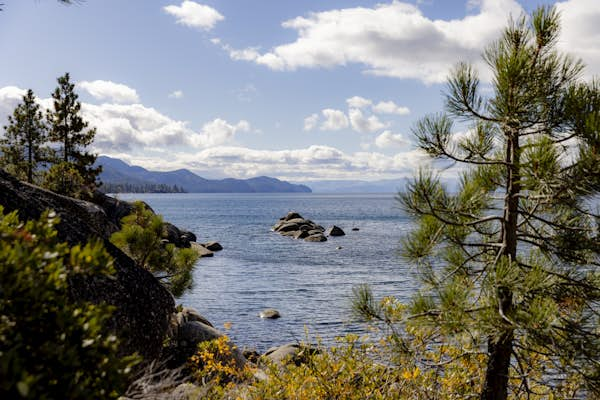Explore the largest alpine lake in North America
It’s hard not to be captivated the first time
you lay eyes on Lake Tahoe. With a
surface area of 191 square miles, the water appears as vast as the turquoise
sky. For the best views, rent a kayak from
Sand
Harbor State Park or Zephyr Cove
Resort and head toward the center of the lake where the water is so clear
you can see more than 70 feet below. Afterward, pull into a cove to sun
yourself on the sand or relax on one of Lake Tahoe’s colossal smooth rocks.
Lake Tahoe is just as bewitching in the
winter, when the snow-covered Sierra Nevada casts its reflection across the
lake. The region becomes a wonderland for snowshoeing, snowmobiling, and skiing
at resorts like
Mount
Rose Ski Tahoe or Diamond
Peak Ski Resort. For an unforgettable winter hike, head to
Chickadee
Ridge. Although you’ll often need snowshoes after a fresh dump of powder or
in icy conditions, the snow is often firm enough to trek through the forest in
boots or waterproof shoes. The views of the lake at the summit are
breathtaking, but the real stars of this hike are the mountain chickadees that
frequent the area.

Sink into surreal
scenescapes
Las Vegas is so famous for its neon lights and
entertainment that it’s easy to forget the city is surrounded by dramatic
desertscape. Red Rock Canyon National Conservation Area is only a 20-minute drive away,
but this kingdom of rust-red canyons, sandstone bluffs, and ancient petroglyphs
might as well be in another universe. Designated trails are perfect for
mountain bikers who want to get up close and personal with the spectacular
scenery.


The Calico Hills offer some of the park’s most
unique hikes including the Calico Tanks Trail, which winds its way up banded
rock formations to a natural pool. The crags and canyons are a paradise for
climbers: the area contains more than 1,200 named routes of sandstone, basalt,
and limestone – some of which offer the occasional glimpse of the Las Vegas
Strip in the distance.
Red Rock Canyon is also home to a population
of burros. They are understandably shy, but you can sometimes spot them in the
park’s northern section near Cold Creek.

Listen to the sand
sing
Just outside Fallon, in the northwestern
section of the state, you’ll find
Sand
Mountain Recreation Area. The epic two-mile-long, six-story-high dune is
beloved by ATV riders and off-roaders. It’s also one of only a few singing sand
dunes in the world, and you’ll sometimes hear it whistle, hum, and moan as the
sand tumbles. In the center of it all, you’ll find the Super Bowl, a giant
hollow carved by wind that, incredibly, remains intact no matter how much the
sand around it shifts.
This is the world’s only place to see the rare
Sand
Mountain blue butterfly. The butterflies only live one week, and they never
stray more than a 200-foot radius from the Kearny’s buckwheat that makes up
their food source. Each one is a tiny blue miracle.




Wander prehistoric
slot canyons
One favorite off-the-beaten-track place in
Nevada is also one of its most awe-inspiring. Cathedral
Gorge State Park was formed by ancient volcanic eruptions forming a fault
that eventually filled with water. Over many millennia, the lake drained,
leaving behind an otherworldly landscape of majestic hoodoos, spires, and slot
canyons.
One of the best hikes in the park is the
Juniper Draw Loop Trail, a 3.6-mile loop that begins at the Cathedral Gorge
State Park campground. The terrain is mostly flat, and the path cuts through
several sandy stretches dotted with juniper and sage and framed by dramatic
rock formations.
Cathedral Gorge State Park is particularly
rewarding at sunrise and sunset. At these hours, the light plays in the slots
and pockets of the canyons, and the creamy peach-colored rocks turn to a fierce
bright orange. To take it all in, head to the Miller Point Overlook—a gazebo
constructed by the Civilian Conservation Corps in the 1930s—which offers some
of the best vistas in the park.

Stargaze along the
Extraterrestrial Highway
Nevada’s Extraterrestrial
Highway is equal parts history, beauty, and kitsch. Home to the legendary Area 51
(the once top-secret government facility rumored to hide an alien spaceship),
this area offers everything from UFO-themed bars to a black mailbox
that may or may not serve as a rendezvous point for visitors from outer space.
This region of Nevada is as alluring to
history buffs as it is to UFO enthusiasts since it’s peppered with ghost
towns, old cemeteries, and historic mining communities. Mostly, though,
it’s a lot of gorgeous desert scenery and open roads. When you visit, raise
your gaze to the night sky. You might not see spacecraft, but since there isn’t
any light pollution on this long stretch of highway, the stars burn beautiful
and bright.
Nevada’s public lands belong to the people.
You can help preserve these incredible natural places by carrying reusable
water bottles, keeping to dedicated trails, and packing out what you pack in.
These small acts ensure that Nevada will be just as wild, wonderful, and
welcoming when you’re ready to come back again.

